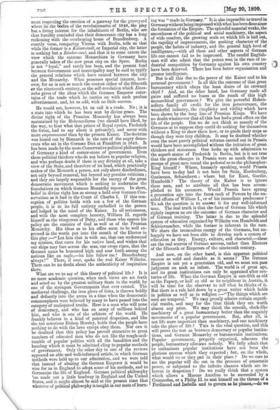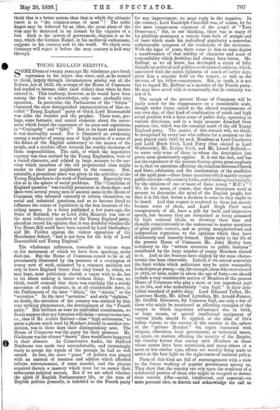THE GERMAN EMPEROR'S IDEA OF MONARCHY.
THE German Emperor has added to his many other functions that of playwright. . The news from Berlin is that the one topic of conversation there is the production of the historical play called Eisenzaltn—i.e., "Iron Tooth —the first performance of which took place before the Kaiser at Wiesbaden. The Kaiser must have listened to the performance with all the-interest of a young dramatic author on the first night of his play, for we read that "many of the most striking and effective passages are actually from the , Emperor's pen." We need not describe the plot, which is • based on a conflict that broke out in 1447 between tht: citizens of Berlin and the Elector Frederick II. of Branden- burg. As there happens to be a controversy at the present time between the Berlin Municipal Canncil and the Govern. ment respecting the erection of a gateway for the graveyard where lie the bodies of the revolutionaries of 1848, the play has a living interest for the inhabitants of Berlin, who are thus forcibly reminded that their democratic city has a long reckoning with the overbearing house of Brandenburg. A courtly verse, comparing Vienna with Berlin, tells us that while the former is a Kaiserstadt, or Imperial city, the latter is nothing but a .Riiuber-nest, and that is to some extent the view which the extreme Monarchists in Germany have generally taken of the now great city on the Spree. Berlin is not "loyal," and rarely has been, and the present feud between Government and municipality may be said to typify the general relations which have existed between the city and the Monarchy. What possesses special interest, how- ever, for us is not so much the contest either of the fifteenth or the nineteenth century, as the self-revelation which Eisen- zahn gives of the ideas which the German Emperor enter- tains of the trade which he carries on with such profuse advertisement, and, let us add, with no little success.
He would not, however, let us call it a trade. No; it is a state into which he has been sent by divine grace. The divine right of the Prussian Monarchy has always been maintained by the Hohenzollerns (we should have liked, by the way, to hear what that prince of Royal cynics, Frederick the Great, had to say about it privately), and never with more empressement than by the present Kaiser. The doctrine was hissed out by Bismarck in the ears of the angry demo- crats who sat in the German Diet at Frankfort in 1849. It has been made by the more Conservative political philosophers of Germany a kind of corner-stone of government. Even those political thinkers who do not believe in popular religion, and who perhaps doubt if there is any divinity at all, take a view of the State, and therefore of its head, which practically makes of the Monarch a person, not only above disobedience, not only beyond removal, but beyond any genuine criticism ; and they are largely responsible for the energy of the great democratic movement which is seeking to undermine the foundations on which German Monarchy reposes. In short, belief in divine right has as strong a hold over German Con- servatism as it had in the Court of Charles I. If this con- ception of politics holds with not a few of the German people, it is in its full entirety embodied in the person and lodged in the mind of the Kaiser. In all seriousness, and with the most complete honesty, William II. regards himself as the vicegerent of Deity, and those who oppose his policy are the enemies of God as well as of the Prussian Monarchy. His ideas as to his office seem to be well ex- pressed in the words put into the mouth of the Elector in this play :—" Let him that is with me, that can understand my mission, that cares for his native land, and wishes that our ships may fare across the seas, our crops ripen, that the German name be honoured high and soar forth among the nations like an eagle,—let him follow me ! Brandenburg always!" There, if ever, spoke the real Kaiser Wilhelm. There can be no doubt about the authenticity of inspiration there.
What are we to say of this theory of political life ? It is no mere academic question, when such views are set forth and acted on by the greatest military State in the world, by one of the strongest Governments that ever existed. The mediteval challenge, the iron glove of Gotz, is thrown boldly and defiantly into the arena in a time when the democratic commonplaces were believed by many to have passed into the category of undisputed truths. Here is a man who will none of democracy, and who has an army of millions behind him, and who is one of the arbiters of the world. He frankly believes in a kind of paternal despotism, and like the too notorious Bishop Horsley, holds that the people have nothing to do with the laws except obey them. Nor can it be doubted that this policy has proved attractive to great numbers of educated men who do not like the rough-and- tumble of popular politics with all the banalities and the humbug which it must be admitted din.- to popular methods of government. Only the other day in one of the reviews appeared an able and well-informed article, in which German methods were held up to our admiration, and we were told that instead of abusing the German Emperor it would be wise for us in England to adopt some of his methods, and to Germanise the life of England. German political philosophy 'aas made not a little headway in England and the United States, and it might alinost be said at the present time that whatever of political philosophy is taught in our seats of learn- ing was "made in Germany." It is also impossible to travel in Germany without being impressed with what has been done since the formation of the Empire. The splendid material works, the smoothness of the political and social machinery, the aspect of wide comfort, the growing scale on which life is laid out, the rapidity of improvements, the pushing character of the people, the habits of industry, and the general high level of intelligence,—with all these and other aspects of German life one cannot fail to be impressed. The candid English- man will also admit that the points won in the race of in- dustrial competition by Germany against his own country have been deserved. There has been better organisation and greater intelligence. But is all this due to the power of the Kaiser and to his personal government ? Is all this the outcome of that great bureaucracy which obeys the least desire of its crowned chief ? And, on the other hand, has Germany made all gains and suffered no losses as the result of this high monarchical government ? We give the powerful Hohen- zollern family all credit for the iron .perseverance, the wonderful industry, the simplicity and virility which have been shown by the long line of Prussian Kings. We have no doubt whatsoever that all this has had a great effect on the life of the people. But we do not think so meanly of the Germans as to suppose they could do nothing for themselves without a King to show them how, or to guide their steps as though they were tiny children. It may be doubted whether even the most purely political reforms carried out in Prussia would have been accomplished without the initiation of great thinkers and statesmen. One looks up with admiration to the superb statue of Frederick in Berlin, but is it not true that the great changes in Prussia were as much due to the groups of great men round the pedestal as to the philosopher: King himself ? Where, humanly speaking, would Prussia have been to-day had it not been for Stein, Hardenberg, Gneisenau, Scharnhorst ; where but for Kant, Goethe, Humboldt ? The theory of the Kaiser is to ignore these men, and to attribute all that has been accom- plished to his ancestors. Would Prussia have sprung a generation ago into the front rank of Powers by the un- aided efforts of William I., or of his immediate predecessor ? To ask the question is to answer it for any well-informed man. The real truth is that the facts of German life which rightly impress us are the outcome of German character and of German training. The latter is due to the splendid system of education organised by Wilhelm von Humboldt and Schleiermacher, while the former is inherent in the race. We share the tremendous energy of the Germans, but un- happily we have not been able to develop such a system of education as they. Energy, culture, and character,—these are the real sources of German success, rather than Electors of the fifteenth or Emperors of the nineteenth century.
And now, on the other hand, is this apparent political success so solid and durable as it seems ? The German Empire is not yet a generation old, and we must not pass judgment on such an infant. The world is of great age, and its great institutions can only be appraised after cen- turies of life. When the German Empire is one-fifth as old as the Papacy, or half as old as its neighbour in Austria, it will be time for the observer to tell what he thinks of it. But there is a rule laid down by a great writer which holds in politics as well as in religion :—" The things which are seen are temporal." We may greatly admire certain superfi- cial results, and may for the time think they are worth almost any price. We may think the smooth, clock-like machinery of a great bureaucracy better than the ungainly movements of a popular ovvernment. But, after all, is not life more important than machinery, and can machinery take the place of life ? This is the vital question, and this will prove the test as between democracy or popular institu- tions, and German Monarchy or bureaucratic institutions. Popular government, properly organised, educates the people, bureaucracy educates nobody. We fully admit that to enthusiasts popular institutions have not been the glorious success which they expected ; but, on the whole, what would we or they put in their place ? Do we care to see the popular will die out in the presence of autocratic power, or subjected to the infinite chances which are in- herent in despotism ? Do we really think that a system which allows a Marcus Aurelius to be succeeded by a Commodus, or a Philip II. to seat himself on the throne of a Ferdinand and Isabella and to govern as he pleases,—do we think that is a better system than that in which the ultimate resort is to "the common-sense of most " ? The noble despot may be followed by an idiot, the great plans of the wise may be destroyed in an instant by the vagaries of a fool. Such is the system of government, disguise it as he may, which the German Kaiser, in his mediteval enthusiasm, suggests to his country and to the world. We think even Germany will reject it before the next century is half-way through.








































 Previous page
Previous page